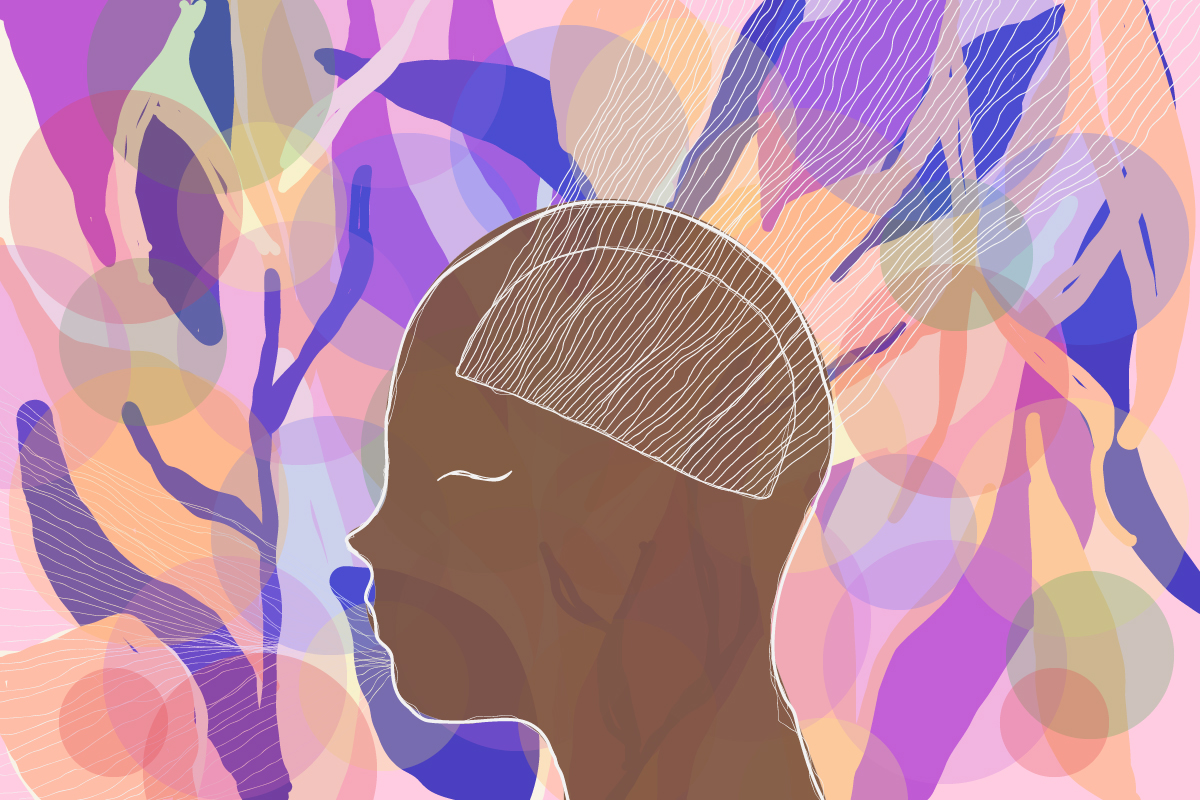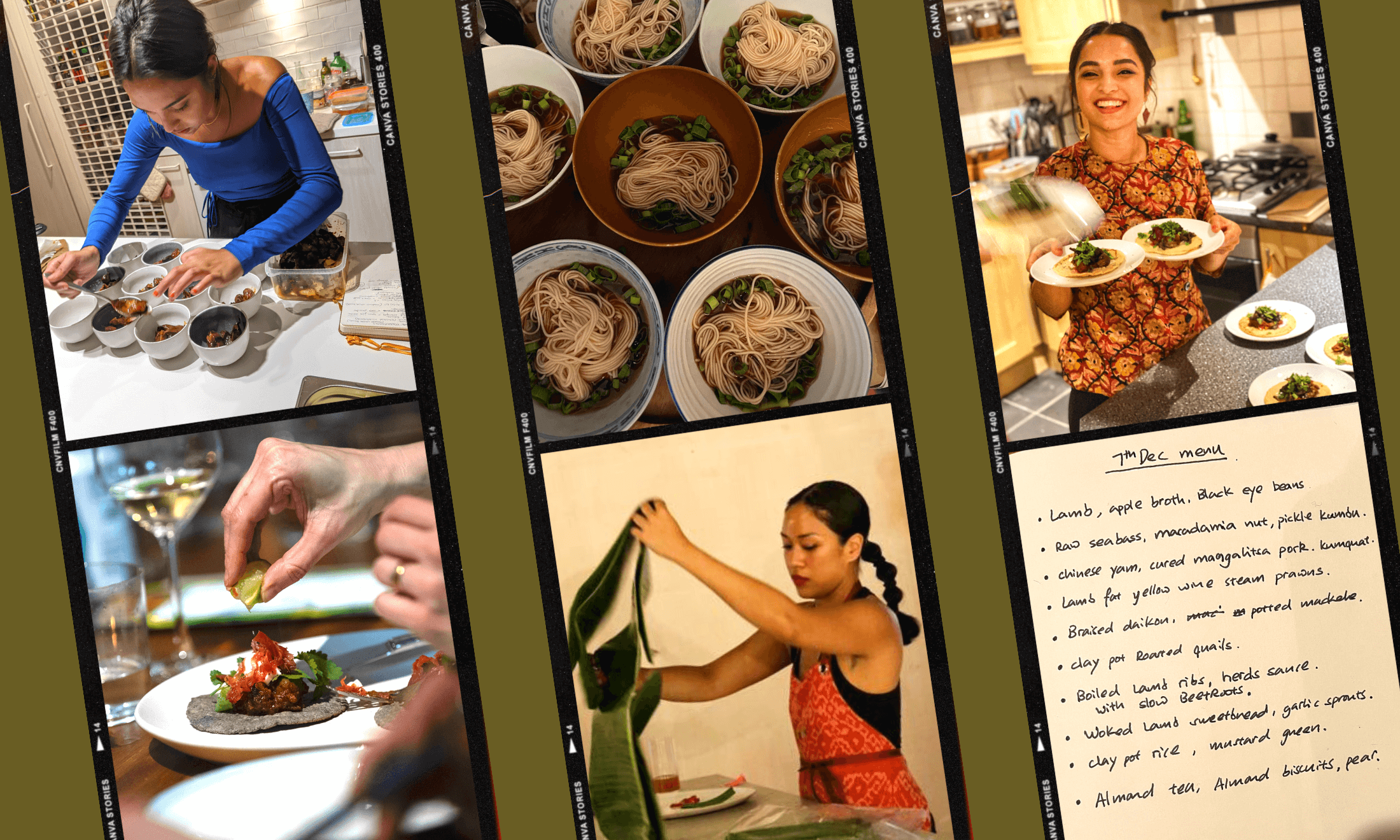
Illustration by Michelle Wong
TW: mentions of abuse and trauma
“Now I want you to picture your ancestors; those ancient people deep in Africa. Imagine their spirit, their culture, their strength.”
My eyes snapped open. Oh. Dear.
“Closed please Lily. Call on them for guidance today. Good, now breathe…breathe.”
I was 22, sat in a tiny therapist centre in an even tinier, exceptionally incensed room in Brighton. Up until this point, I have been convincingly playing the part of someone who was sincerely attempting to be hypnotised. At this stage in my life, trichotillomania, a chronic compulsive disorder I have had since childhood was becoming unmanageable and my lovely mum, in lovely desperation had found a lovely hypnotherapist to help me stop this destructive habit before I had no hair left at all.
He was very lovely. He was also a straight, white man.
“As a queer woman of colour, I leave therapy sessions feeling incomplete, as though I have to reduce and compartmentalise myself to make my reality palatable.”
In fact, all but one of the various counsellors and therapists I’ve worked with over the years have been white and, to my knowledge, straight. I was involuntarily “assigned” a black counsellor when I was 15 by my school, but I was so angry at them for making me go that I refused to say anything to her at all until they relented and sent me back to double English.
Don’t get me wrong, I’ve certainly felt supported and helped by these straight, white therapists and can credit this man in particular with getting me through a particularly difficult part of my life. This was far from my “Get Out” moment, thank God. But after this well-meaning but bizarrely racist exchange about my “ancestors” that had directly followed a chat about how important my hair was in feeling proud about my black heritage, I never, ever brought up my blackness again.
More recently, another well-meaning straight and white therapist, a woman this time, asked me out of the blue towards the end of the session if I, “had any problems with being gay?” My firm (and truthful) “no” visibly shocked her. We moved swiftly on.
The bottom line is this; as a queer woman of colour, I leave therapy sessions feeling incomplete, as though I have to reduce and compartmentalise myself to make my reality palatable (read: less black, less gay) to my therapists. I make painful efforts to carve out the black and queer from my womanhood, childhood loss and mental health as though these have not grown from and into each other. Why, as a proud black queer feminist, am I catering for white heterosexual fragility in a space that should be supporting my black queer healing? Was someone who was straight and white even the right therapist to be working with?
“She was really uncomfortable talking about toxic masculinity and abuse in the context of a queer relationship because she doesn’t share those experiences”
Whilst statistics specifically regarding black LGBTQI+ mental health in the UK are hard to come by, the current stats for both LGBTQI+ and black British communities in relation to this issue are pretty damning. A 2014 NHS funded study reported that LGBTQ+ people in the UK are at a higher risk of experiencing poor mental health, self-harm, alcohol and substance abuse than heterosexual folk, and this is directly attributed to the homophobia and transphobia we experience in wider society.
The same study also found that although one in three British black women suffer from a common mental health problem (for comparison, this is nearly 10% higher than British white women), black British adults have the lowest treatment rate of any ethnic group in the country.
With this in mind, I asked a few friends, who also identify as queer women or non-binary people of colour, what their experience has been when seeking or in therapy. Was this othering specific to my experiences or an example of a wider, systemic issue in British therapy?
“I have never felt totally comfortable disclosing or discussing lots of aspects of my identity and how this relates to my lived experience,” says Leo*, who identifies as non-binary and mixed-race. “I think this partially comes from not feeling like they would relate or understand, but also from within and my own mixed feelings and confused ideas about how my identity(ies) feed into my mental health.”
“What is keeping British therapy so white, cis-heterosexual and middle class, even in cities in London and Manchester where this does not reflect the demographic?”
Ruby*, a queer mixed-race midwife in London, was seeing a white, cis-het therapist until last year. Her sessions were limited by a deep lack of understanding on the part of the therapist when she began to talk about the abuse she had suffered in a relationship with a black, trans, non-binary person.
“Yeah, she handled that badly. I could feel she was really uncomfortable talking about toxic masculinity and abuse in the context of a queer relationship because she doesn’t share those experiences and could not relate. I loved my therapist, but those were huge barriers in her ability to give me authentic, wholesome, holistic therapy.”
While having extensive professional knowledge of how abuse manifests itself in domestic relationships was not a problem for Ruby’s therapist, our models of reference for those dynamics are constructed with straight, white, cis partnerships in mind. The problem was that when confronted with situations which lay outside of her realm of experience, the therapist was stumped. Typically, she attempted to re-focus on aspects of Ruby’s trauma that were, at surface level, unconnected to her being black and queer, something that both frustrated and isolated Ruby.
“When it came to my family issues that were ‘unrelated’ to my racial and sexual identity, she became very interested. It was really clear to me the difference between what she was comfortable delving into and what she wasn’t. I would say my most significant identifiers are that I’m a woman, I’m queer and I’m a PoC [person of colour]. Because she didn’t know how to handle two out of three of those, I was reduced to a raceless woman with vague family trauma which barely scratched the surface.”
Like Ruby, Monisha, a queer black multiracial student based in Leeds, feels the abuse she has experienced in black, queer relationships has had a uniquely racialised and gendered character that would be near impossible to grasp for a therapist, or indeed anyone, who didn’t also share that lived experience.
“The issues in my past relationships are very nuanced unless I had a therapist who was also a queer woman of colour I’m not sure they’d be able to get it.”
What is keeping British therapy so white, cis-heterosexual and middle class, even in cities in London and Manchester where this does not reflect the demographic? I spoke to Zayna Ratty, a bisexual psychotherapist and woman of colour based in Oxford, about the barriers queer people of colour face in getting into the industry.
“It costs about £20,000 to do the training and get accredited, so financially you can be excluded”
“I’m a member of the academic board of a training college I’m in, and we ask, ‘Why are we not getting more people of colour to advanced level?’” She told me over the phone. “It costs about £20,000 to do the training and get accredited, so financially you can be excluded. Then if you can make it work, you walk into a therapy room, into your training room, and most don’t look like you. You’re going to get hit by multiple forms of exclusion and the more these micro-aggressions build up, the more people just go ‘oh I’m not doing this anymore, I don’t fit in.’”
As well as running her own practice, Zayna works with LGBTQI+ mental health organisations Oxford Friend, Stonewall, Pink Therapy and PolyDay, as well as presenting at conferences to stress the importance of intersectional, informed therapy.
“Traditional therapy being a monocultural pursuit is the worst kept secret in the profession,” Zayna explains. “I try to raise the issue whenever I am given a voice. When we are lacking in knowledge we retreat to our safe space and for many people that space is of intolerance and confusion.
I found Zayna by scrolling through the pages and pages of white faces in the “Gay” and “Lesbian” section of Psychology Today’s counselling directory – a word of warning though, many of the people I contacted through this site were not LGBTQI+ identifying, merely had experience of working with people from the community.
“When it came to my family issues that were ‘unrelated’ to my racial and sexual identity, she became very interested”
For those who have all but given up on traditional avenues of mental health support, therapy is not the only option. In fact, all of those who I spoke to stressed the importance of having access to LGBTQI+ networks of colour on their mental health and wellbeing.
“My friends are my fucking life support for real,” Monisha told me. “Self-care to me is mainly having QTPOC (queer and trans people of colour) friends. 90% of my friends are QTPOC and that is an active, conscious choice I have made and I’m pretty sure that is how I want to live the rest of my life.”
Attending nights like BBZ, Pxssy Palace and Wotever World, and having brilliant QTPOC friends near me who I feel safe around has been enormously affirming. I have also felt just as inspired online, following amazing LGBTQI+ women and non-binary people of colour sharing and holding knowledge on Twitter, and reading the challenging and inspiring work. Even writing this piece has allowed me to connect and feel seen more authentically than any therapy session ever has. Perhaps I have been searching in the wrong places; perhaps it is community and not traditional therapy that can provide the real care and support we need to heal. I’m not writing off my search for a therapist who “gets” me, but until then, I have some gay AF, brown AF friends I’m running late for.
If you or a loved one need to find a therapist, contact the Black, African and Asian Therapy Network. If you’re Brighton-based, LGBTQI+ mental health charity Mind Out hold peer support groups for PoC and one-to-one counselling sessions.
*Some names have been changed









